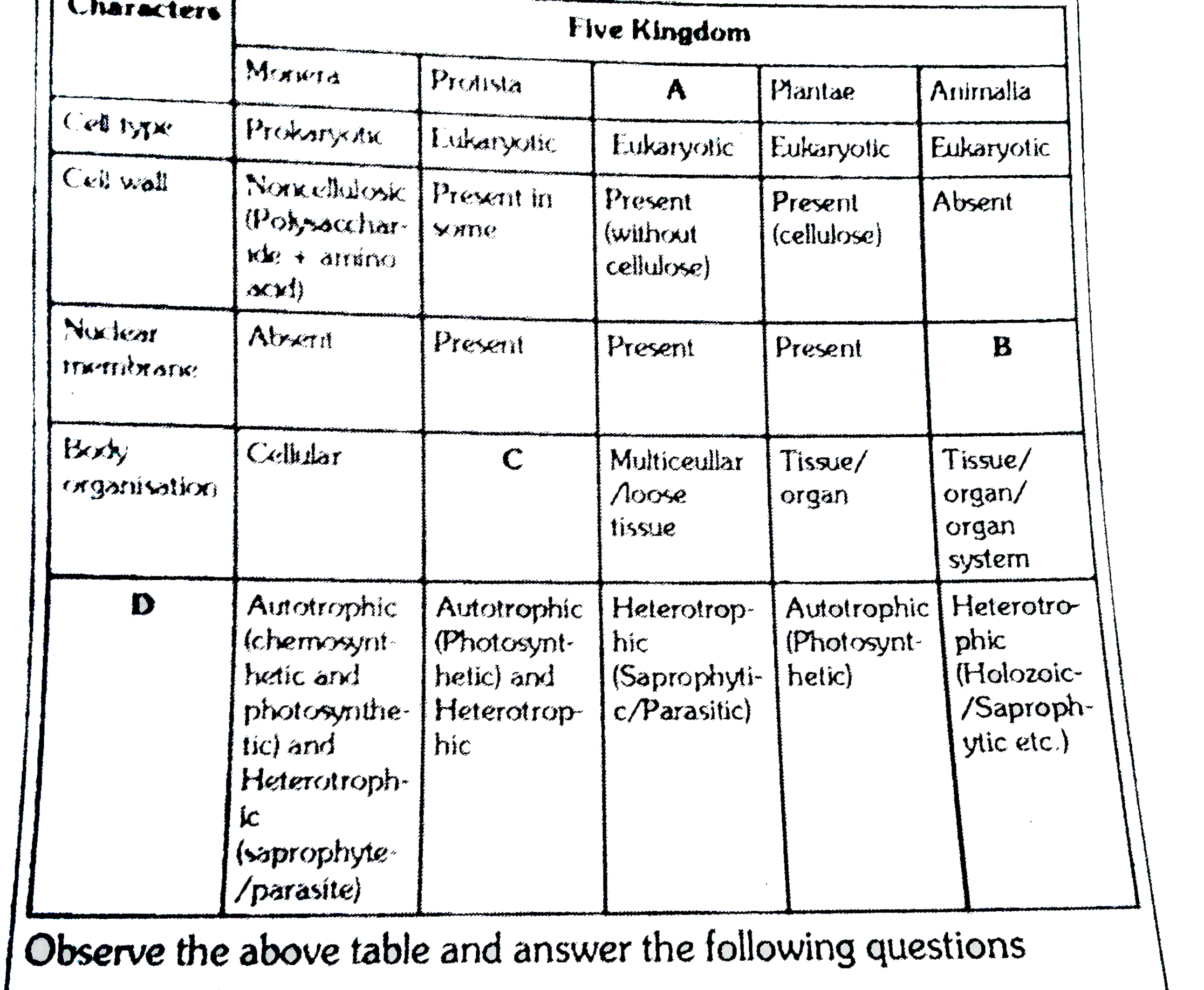Multicellular producers belong to kingdom
Protista
Protista and Plantae
Plantae
Plantae and Mycota
The correct Answer is:C
Step-by-Step Solution:
1. Understanding the Question: The question asks about the kingdom to which multicellular producers belong, according to the Whittaker classification system.
2. Whittaker's Classification: In 1969, Robert H. Whittaker proposed a classification system that divided living organisms into five kingdoms: Monera, Protista, Fungi, Plantae, and Animalia. This classification was based on three criteria: complexity of cell structure, complexity of the organism's body, and mode of nutrition.
3. Identifying Multicellular Producers:
- Producers are organisms that can make their own food through photosynthesis.
- Multicellular producers are typically green plants that have complex structures and are capable of photosynthesis.
4. Analyzing the Options:
- Option 1: Protista - This kingdom primarily consists of unicellular organisms. While some protists can perform photosynthesis (like algae), they are generally unicellular, so this option is incorrect for multicellular producers.
- Option 2: Protista and Plantae - This option is misleading because, as stated, Protista includes unicellular producers, while Plantae includes multicellular producers. Therefore, this option is also incorrect.
- Option 3: Plantae - This kingdom includes all green plants, which are multicellular and capable of photosynthesis. Thus, this option is correct.
- Option 4: Mycota - This term refers to fungi and is not recognized as a kingdom in Whittaker's classification, making this option incorrect.
5. Conclusion: Based on the analysis, the correct answer is that multicellular producers belong to the kingdom Plantae.
---
- Producers are organisms that can make their own food through photosynthesis.
- Multicellular producers are typically green plants that have complex structures and are capable of photosynthesis.
- Option 1: Protista - This kingdom primarily consists of unicellular organisms. While some protists can perform photosynthesis (like algae), they are generally unicellular, so this option is incorrect for multicellular producers.
- Option 2: Protista and Plantae - This option is misleading because, as stated, Protista includes unicellular producers, while Plantae includes multicellular producers. Therefore, this option is also incorrect.
- Option 3: Plantae - This kingdom includes all green plants, which are multicellular and capable of photosynthesis. Thus, this option is correct.
- Option 4: Mycota - This term refers to fungi and is not recognized as a kingdom in Whittaker's classification, making this option incorrect.
Topper's Solved these Questions
- BIODIVERSITT AND CONSERVATIONBook:TRUEMEN BIOLOGY ENGLISHChapter:BIODIVERSITT AND CONSERVATIONExercise:MULTIPLE CHOICE QUESTIONS
Explore 116 Videos
- BIOTECHNOLOGY : PRINCIPLES AND PROCESSESBook:TRUEMEN BIOLOGY ENGLISHChapter:BIOTECHNOLOGY : PRINCIPLES AND PROCESSESExercise:MULTIPLE CHOICE QUESTIONS
Explore 124 Videos
Similar Questions
Knowledge Check
The multicellular decomposers belong to kingdom
AmoneraBprotistaCfungiDplantaeEuglena belongs to kingdom
AmoneraBprotistaCplantaeDanimaliaSpirulina belongs to kingdom
AplantaeBmoneraCprotistaDfungi
Multicellular decomposers are
View SolutionMulticellularity is useful for
View Solution[A] : Unicellular organisms occur in 3 kingdoms .
[R] : Multicellular organisms also occur in 3 kingdoms .
View Solution
Q. How many kingdoms include producers and name these kingdoms?
View SolutionCyanobacteria belong to kingdom
View Solution
